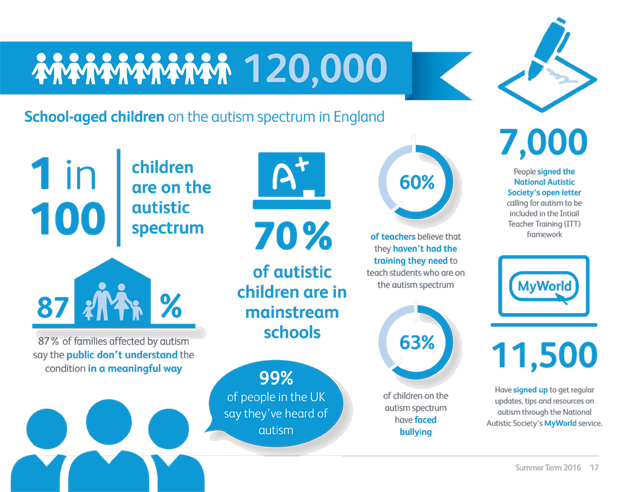Earlier this year, the National
Autistic Society held its
first ever Schools’ Autism
Awareness Week and wrote to
the Education Secretary, Nicky
Morgan, calling for all teachers
to receive autism training.
Mark Lever, Chief Executive of
the National Autistic Society,
explains why it’s so important
that schools, including both
teaching staff and students,
understand autism.
With more than 1 in 100
children on the autism spectrum,
and over 70% in mainstream
schools, every teacher and
student will encounter autistic
people in their classes.
How well do schools really understand
autism?
Over 99% of people in the UK say they’ve
heard of autism, but autistic people and
families say that knowing there’s something
called autism doesn’t mean they are
understood – 87% of them say the public
don’t understand autism in a meaningful way.
This lack of understanding is clearly having an
impact in schools, with surveys indicating that
63% of children on the autism spectrum have
faced bullying, often due to fellow students
misunderstanding their behavior. This can have
a devastating impact on their self-esteem, in
some cases creating problems that last into
adulthood.
What is autism?
Being autistic means you see, hear and feel the
world in a different, often more intense, way
to other people. There are roughly 120,000
school-aged children on the autism spectrum
in England and none of them will experience
autism in the exact same way. Some people
may be skilled in certain areas while others find
social situations and change such a challenge
that they face almost unbearable levels of
anxiety.
Understanding autism
Awareness sounds like a relatively small thing
but it can have a transformative effect. Autistic
people and their families don’t expect or
want people to be experts. But having some
knowledge about the situations autistic people
might find difficult and how they may respond
will make a huge difference. It would reduce
instances of misunderstanding and bullying,
help autistic people feel more accepted and to
reach their full potential.
Our role
To make this happen, the National Autistic
Society encouraged schools across the country
to get involved in their first ever Schools’ Autism
Awareness Week and help their students and
staff improve their understanding of autism
and raise vital funds for the charity. We were
overwhelmed by the response, with almost two
thousands schools signing up to get involved.
We know how busy schools are so we created a
range of resources and activities so they could
do as little or as much as they like – from Early
Years Foundation Stage right up to Key Stage
4. Some schools adjusted their lesson plans to
include autism, making use of our resources,autism word searches and book lists.
It was a brilliant week and truly remarkable
to see the sheer range of activities. None of
this would have been possible without the
commitment of staff within each school to
improve understanding of autism.
Every teacher should have autism training
But autism awareness shouldn’t be a thing
that happens just once a year. We believe
that all teachers, from their first day, should be
given the training they’ll need to teach autistic
students. Yet, autism training is not mandatory
for teachers and some start school without
any autism or even special educational needs
training at all. People are often shocked when
we tell them this. How can a teacher help an
autistic student if they don’t understand the
basics about autism?
Of those surveyed, 58% of children and
young people on the autism spectrum said
that the single thing that would make school
better for them is ‘if teachers understood
autism’. Research by Ambitious about Autism
found that over half of parents of children
with autism have kept their child off school
because of a lack of appropriate support in the
classroom.
It’s not only children on the autism spectrum
and their families who think compulsory
autism training would make a huge difference.
A survey of teachers by the teachers’ union
NASUWT also found that 60% believe that
they haven’t had the training they need
to teach students who are on the autism
spectrum. And 11,500 teaching staff have
signed up to get regular updates, tips and
resources on autism through the National
Autistic Society’s award-winning MyWorld
service.
We have asked the government to help
This is why, this Schools’ Autism Awareness
Week, the National Autistic Society has teamed
up with Ambitious about Autism and wrote an
open letter to the Education Secretary, Nicky
Morgan, calling on her to include autism in the
Initial Teacher Training (ITT) framework for
England, which the Government is currently
reviewing. Over 7,000 people signed our letter,
including MPs, autism experts and education
professionals, in just a couple of weeks. We
have asked the Education Secretary to listen to
their voices and take action.

For general enquiries
0808 291 3524
Or we can call you back at a time of your choice
Phone lines are open 24/7, 365 days a year

